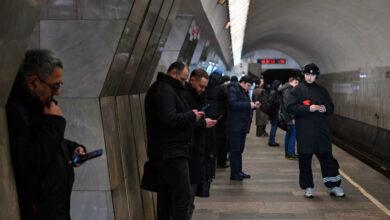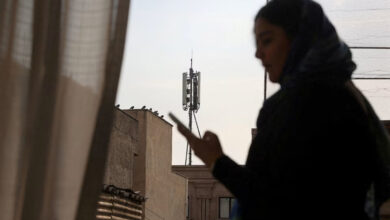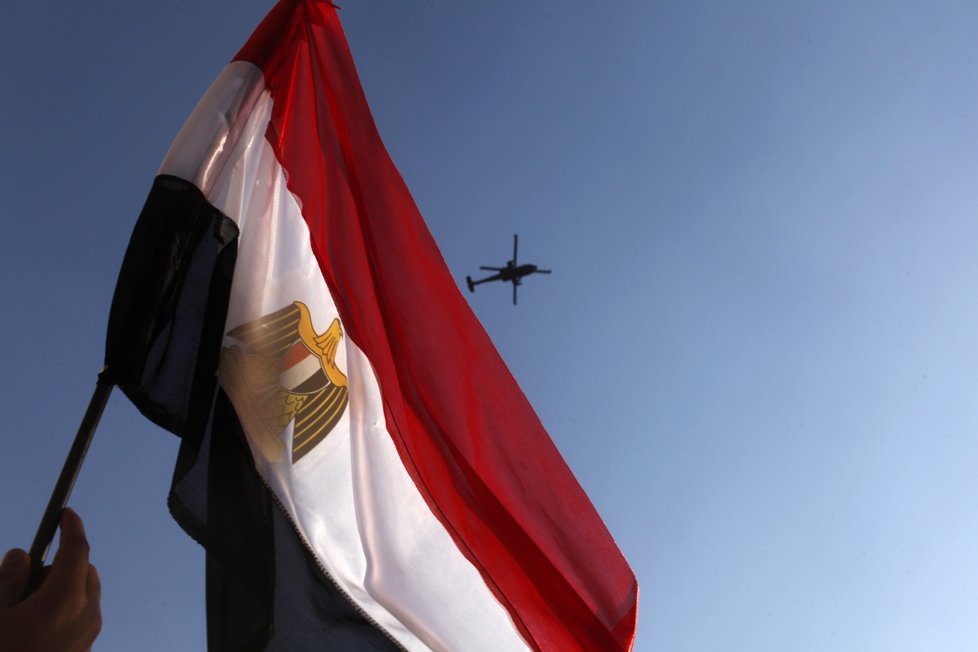Egyptian publishers potentially had much to mourn after the Publishers Association announced on Wednesday that the 43rd Cairo International Book Fair would be indefinitely suspended. Yet it has been difficult to find a glum face, and many publishers and booksellers are meeting the new era with new ideas.
In response to the suspension of the 2011 Cairo book fair, the American University in Cairo (AUC) Press announced plans for a "Tahrir Book Fair," to be held at the downtown campus at the end of March. According to the publishing house’s R. Neil Hewison, the Tahrir fair will be open to the general public, "to give back something of the lost Cairo International Book Fair to readers, albeit on a smaller scale."
Other publishers will be invited to sell their books, Hewison said, adding that they hoped "to have a good mix of Arabic and English books."
Over at Dar al-Balsam and the al-Balsam bookstore, Balsam Saad was showcasing new Arabic-language titles on the lives of Nelson Mandela and Mahatma Gandhi to help children learn about nonviolent revolution. Dar Merit helped to organize a poetry reading in Tahrir Square, the epicenter of the mass pro-democracy protests. Alef was soliciting suggestions on how the bookstore chain could approach the new era, and Shorouk Bookstores announced on Facebook on 13 February: “And we are back to work….Proud and Free…:)”
Early in the week, it had seemed as though the Cairo International Book Fair might yet go on in February. The General Egyptian Book Organization (GEBO) submitted a request to Prime Minister Ahmed Shafik to open the fair, which had been set to run from 29 January to 8 February. The fair was suspended after the Mubarak regime recognized the seriousness of protestors' challenge to its authority.
But a much-delayed fair meant that it was in danger of overlapping with fairs in Riyadh, Muscat, Abu Dhabi and Dubai. So on Wednesday, the Publishers Association asked members to go to the Cairo International Conference Center in Nasr City and collect their books and other materials.
The temporary supervisor of the culture ministry, Zahi Hawass, announced Friday that the ministry is eager not to cancel the 2011 exhibition entirely. A make-up date of May has been floated.
The Cairo International Book Fair is the region's largest, attracting as many as 2 million each year. For many of the nation’s publishers, the fair represents seven percent or more of their annual income.
But, along with the temporary loss in income, the new era also presents many new opportunities. Hewison said that AUC Press was looking at new texts for 2011, "from photography and personal testimony to scholarly studies of the politics, sociology and economics of the 25 January revolution–we want to explore different ways of documenting and understanding the revolution and where it might lead."
The press already is bringing out Galal Amin's Egypt in the Era of Hosni Mubarak, 1981-2010 with a new subtitle (1981-2011) and a new introduction by Amin. Alaa al-Aswany's On the State of Egypt: A Novelist's Provocative Reflections, translated into English by journalist Jonathan Wright, will also soon have a new introduction to reflect the January 25 revolution.
At least one literature professor was responding to the change: AUC’s Samia Mehrez shifted the topic of one spring 2011 course from “Translation, Children's Literature and Cultural Representations” to an all-caps “TRANSLATING REVOLUTION.”
According to Youm7 newspaper, a group of Egyptian writers at the Casablanca Book Fair in Morocco announced earlier this week that they expect a new era in publishing, following on new possibilities for free expression and creativity. However, novelist Khaled al-Berry, while positive about the changes, noted that there have been different forms of censorship in Egypt, “political, religious and moral.”
Al-Berry, on this year’s shortlist for the International Prize for Arabic Fiction for his Middle Eastern Dance, said that there was far more to censorship than simple book banning. By blocking access to information, he said, the regime “made books and reading itself something that one wouldn't be proud of.”
Al-Berry added: “I'm looking forward more transparent society that allows access to information and paves the way to produce 'more valid' books…. But the big task is the change of attitude socially. This needs time. It needs civil organisations to work in order to make books a commodity worth being proud of and worth defending. In the absence of a regime that monopolises 'public services,' I hope we will have a sector of business people who care to build public libraries and to support publishing. That's a real struggle.”
Ultimately, though, al-Berry was optimistic. “The good thing is, there is something deep in the Egyptian culture that values reading and writing–we need to unearth it. I really rely more on the kids and younger generations; they will be the real drive behind prospect of change.”
In this vein, al-Berry called not just for more “literary” literature, but also for more popular literature: detective stories, romances, young adult novels and quality children’s books.
The AUC Press’s Hewison also said he certainly hoped that the new era would bring a new openness, and added that "some of the books we are planning will be looking at the topic of the new lines and the re-emergence of banned culture."




